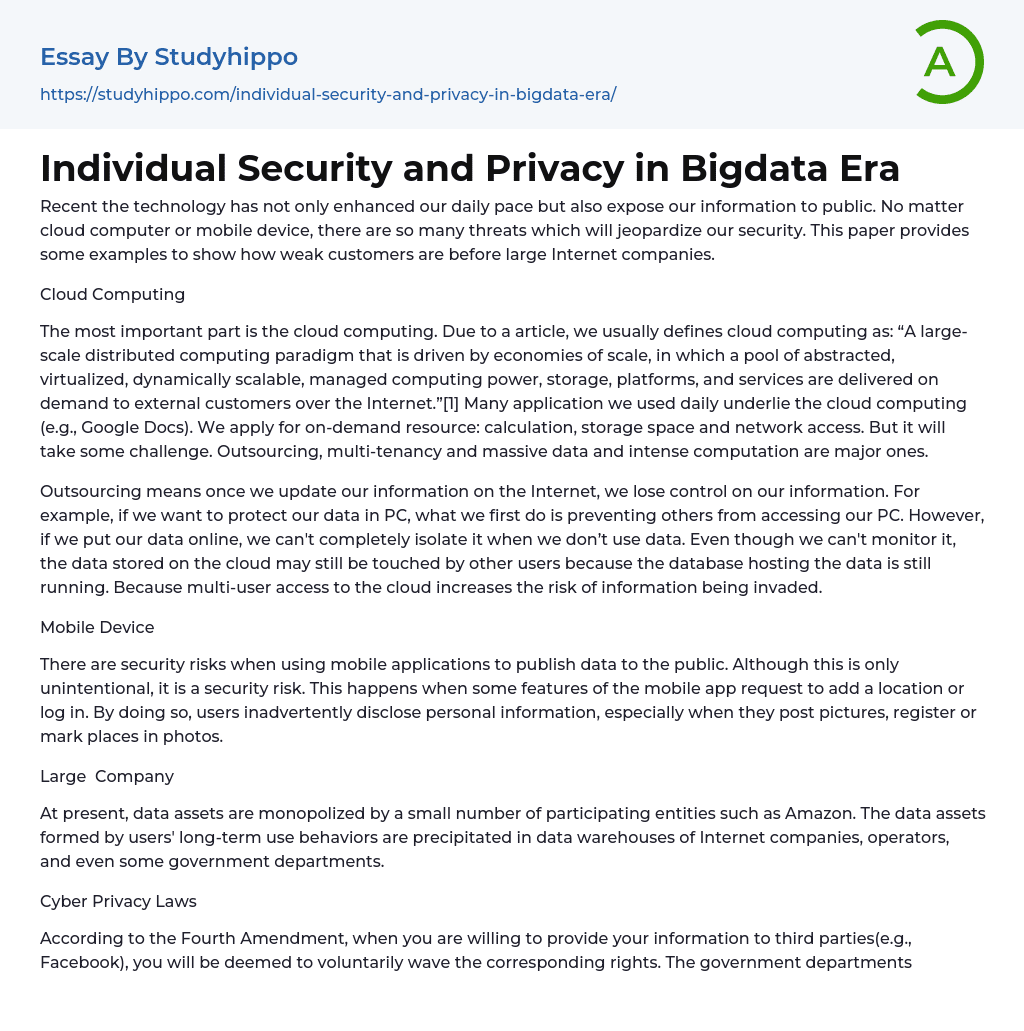

Individual Security and Privacy in Bigdata Era Essay Example
Our personal information is now at risk due to recent technological advancements, which not only speed up our daily activities but also make it vulnerable to the public.
The text explores the range of threats that can compromise our security, whether it is on a cloud computer or a mobile device. It provides examples to illustrate how customers are vulnerable when dealing with large Internet companies.
Cloud Computing
This paper primarily focuses on cloud computing. Cloud computing is often defined as "A large-scale distributed computing paradigm that is driven by economies of scale, in which a pool of abstracted, virtualized, dynamically scalable, managed computing power, storage, platforms, and services are delivered on demand to external customers over the Internet."[1] Many everyday applications we use rely on cloud computing (e.g., Google Docs). We utilize resources such as computation, storage space, and network access whenever required.
>
Despite the presence of various challenges, certain issues must be tackled in order to make progress. These challenges encompass outsourcing, multi-tenancy, and the handling of extensive data and intensive computation. Outsourcing poses a particular challenge as it involves surrendering control over our information once it is uploaded to the Internet. Unlike protecting data on a personal computer where we can restrict access, achieving the same level of isolation becomes unattainable when data is stored online.
Despite the lack of monitoring, data stored on the cloud can be accessed by other users because the database hosting the data is constantly active. This increased access by multiple users makes it more vulnerable to information invasion.
Mobile Device
Publishing data publicly through mobile applications can pose a potential security threat, even if unintended.
Concerns arise from the unintentional disclosure of personal information
through certain features of mobile apps, such as adding a location or logging in. This is particularly relevant when users post pictures, register, or tag locations in photos.
The Dominance of Large Companies
In the present scenario, a few select entities like Amazon dominate data assets. These assets are generated from users' long-term usage behaviors and stored in data warehouses owned by internet companies, operators, and even certain government agencies.
Cyber Privacy Legislation
Voluntarily providing your information to third parties (e.g., Facebook) implies a willing surrender of corresponding rights according to the Fourth Amendment.
The government has the ability to access your personal information without your consent through third parties if they believe it is necessary for an ongoing case, as stated in the Stored Communications Act of 1986.
Present
Ownership of these data resources involves multiple entities working together. For example, Amazon's consumption data is generated by users, merchants, Amazon itself, and other entities collectively. However, no single entity claims ownership of the data. Users do not have control over their own data while Amazon retains actual control over the data resource.
The controllers have gained significant value from using various big data applications like Amazon Pinpoint. What is even more concerning is that users are not only benefiting from the abundance of data resources but also facing associated risks. The Facebook data breach affected 87 million users. Various major companies have recorded every activity we engage in.
Nevertheless, we do not have control over the data. The control and monetization of data will be determined by major corporations through our information. Safeguarding data privacy is essential for human rights, and any use of data assets
should uphold the rights of individuals.
Personal data transactions should not happen without the user's consent, as it is our right to be compensated for our own data. The individual user should have a significant role in deciding the rights of the data subject and gaining benefits from this data. This can often be seen through various unexplained advertisements.
The European Union implemented a policy in 1995 that allows people to have their personal data removed if it is no longer necessary. The responsibility for fulfilling this request lies with the data controller. However, instead of being efficient, this practice results in unnecessary expenses. In 2014, the European Court of Justice affirmed that individuals within the EU have the "right to be forgotten" regarding their personal information.
The right to be forgotten is the entitlement of individuals to request the removal of privacy-related information from data controllers, thus protecting against the misuse of personal data. However, there are limited measures available for its protection.
References
- Foster, Y. Zhao, I. Raicu, and S. Lu, "Cloud computing and grid computing 360-degree compared," Grid Computing Environments Workshop, 2008. GCE'08, 2009, pp. 1-10.



